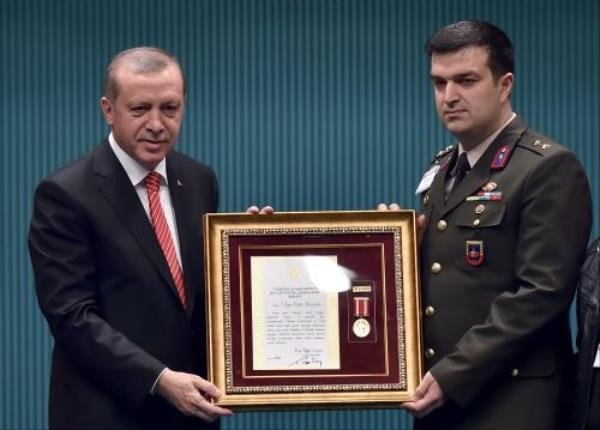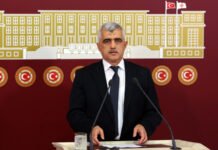
Lt. Musa Kılıçaslan, a decorated military officer in the special operations unit of the Turkish Gendarmerie who was detained after a coup attempt in Turkey on July 15, 2016 and held in a gym that was used as a detention center after the failed coup, recounted the torture and abuse he underwent and witnessed, the Bold Medya news website reported, citing his plea during a hearing in December 2019 in an Ankara court.
Lt. Kılıçaslan was detained with a taser and under a shower of rifle butts, then severely tortured in the blood and urine-covered gym run by the Ankara Police Department that was used as a detention center after the coup attempt by its Anti-Terrorism Department (TEM). Not only did he endure severe torture there personally but witnessed others, including a detained female military officer, being tortured and abused at the hands of security officers.
The Stockholm Center for Freedom had previously reported on the testimony of another military officer detained in the same gym who said he heard the screams of female detainees being raped there, an account corroborated by four other fellow victims. Their recounting of events and descriptions are mutually reinforcing, adding an extra layer of credibility to their accounts and showing that Turkish post-coup abuses also included the rape and abuse of women.
After the coup attempt, torture became widespread and systematic in Turkish detention centers, a fact evidenced by the UN special rapporteur on torture and other cruel, inhuman, or degrading treatment or punishment.
“[I]n the immediate aftermath of the failed coup, torture and other forms of ill-treatment were widespread, particularly at the time of arrest and during the subsequent detention in police or gendarmerie lock-ups as well as in improvised unofficial detention locations such as sports centers, stables and the corridors of courthouses,” the special rapporteur found on his mission to Turkey between November 27 and December 2, 2016.
Turkey also vetoed the publication of a torture report by the European Committee for the Prevention of Torture and Inhuman or Degrading Treatment or Punishment (CPT). CPT, a Council of Europe-affiliated body combating torture and other ill-treatment through unannounced visits to places of detention of member states, which had conducted inspections between August 28 and September 6, 2016 in Turkey.
The delegation’s visit came amid widespread allegations raised first by Amnesty International, which stated that it had collected credible evidence that detainees in Turkey were beaten, tortured, and on some occasions raped in official and unofficial detention centers across the country.
Kılıçaslan lost his right leg in 2012 in a counterterrorism operation and was declared a ghazi (an honorary title for military personnel who survived a war or an armed clash with injuries). He had to wear a prosthesis and received treatment at the Turkish Armed Forces Rehabilitation Center for two years, after which he returned to the gendarmerie to serve in clerical positions.
Kılıçaslan received the title of ghazi at a ceremony held at the presidential palace in March 2015 from Turkey’s president, Recep Tayyip Erdoğan.

Yet the abortive coup attempt that left 251 dead and 2,200 injured upended his life, as it did that of many others. Declaring a state of emergency, President Erdoğan initiated an unprecedented witch hunt, purging some 130,000 civil servants from state jobs and locking up tens of thousands of others on flimsy terrorism-related charges.
President Erdoğan accused his arch-enemy, the faith-based Gülen movement, of masterminding the coup attempt, an accusation categorically denied by the movement. The movement, which had already been designated a terrorist organization (Fethullahist Terrorist Organization – FETÖ) and put into the crosshairs by Erdoğan, has borne the brunt of his post-coup crackdown.
Kılıçaslan was one of those who were detained early on the morning of July 16, a detention that lasted until July 24. He wanted his mother to leave the courtroom during his testimony in December 2019, not wanting her to bear witness to what he had suffered all this time.
‘We bathed in urine mingled with blood on the floor’
“I was detained with a taser and under a shower of rifle butts on the morning of July 16. When I regained my senses, they were loading detainees in their underwear on to buses. When in the bus we were beaten with clubs and stones at the exit of the Gendarmerie General Command headquarters.”
At the Ankara Police Department, they were taken off the bus and handcuffed from behind in their underwear. They had to pass through a “corridor” of police officers one by one, formed expressly to humiliate and beat the detainees.
“I sustained blows to my head, ribs, groin and right leg, which had the prothesis. Because of these blows to my prothesis I could not make it to the end of the corridor. I collapsed on the ground and could not get up again.”
He found himself in the gym of the Ankara Police Department when he regained consciousness. “They were firing guns from outside at the windows of the gym, saying they would come in and kill us. The broken glass shards lacerated our naked bodies and limbs. I had difficulty moving because of the blows I had sustained to my prothesis.”
They did not let the detainees in the gym go to the toilet, forcing them to urinate on the walls. “We bathed in urine mingled with blood, lying on the floor,” he said in describing the situation.
A police officer calling himself Azrael entered the gym and ordered the detainees to turn their backs and crouch on their knees. “I could not do that. I could not even move my limbs. Using handcuffs in his hands he started to beat me because I failed to obey his order. He was beating with all his might while repeating his order. I told him, ‘I can’t, I have a prothesis leg. I am a ghazi.’ He started to beat me harder, repeating all the time, ‘So, you’re a ghazi, huh’.”
He does not remember how long the beating lasted. When the police officer went away, he was taken to an infirmary. A doctor examined him. “He derisively told me: ‘There is nothing to fear. You might have a broken rib or be suffering from brain trauma. Perhaps your prothesis is dislocated because of the blows. That is why you can’t move your leg. I am going to send you to a hospital’.”
He was taken to a state hospital where he received a CT scan. “A doctor, upon seeing the results, said in a panic, ‘We have to intervene immediately.’ Yet, the police officer accompanying me whispered loudly and threateningly in his ear, ‘He is a traitor. You would get into trouble.’ The doctor recoiled. I still remember the fear in his face. He sent me back to the infirmary without doing any medical intervention.”
They abused a female detainee
“When I returned to the infirmary, they brought in a young woman in pajamas. The police officer who brought her said, ‘This is the one in charge of all missiles.’ They beat her severely. I knew her, but I don’t want to reveal her name for fear of humiliating her. A police officer named Süleyman, if my memory serves me right, was saying to her that he would rape her while beating her. ‘We will take you downstairs and rape you one by one.’ I remember her curling up into a ball out of fear. He took it one step further and tried to strip her naked in front of us. Then fortunately another police officer stepped in and she was taken to a partition to change her clothes.”
“One day this police officer entered the room with his right hand hurt. A female police officer asked him what happened. He said he hurt his hand during a beating. ‘I hit somebody in the chin, breaking his cheekbone and hurting my hand’.”
Kılıçaslan added: ”The abused woman was subsequently acquitted. It turned out that she had been at home during the coup attempt. She was detained at her house and taken to the gym. I heard that her abuser was later on awarded the title of ghazi.”
‘There was a torture room in the gym’
Kılıçaslan claimed that there was a torture room in the gym. “They were taking people in and out of there. One day they brought somebody in overalls. The police officer who brought him said that he was an F-16 pilot. I’ll never forget his screams, which lasted until morning. His face was completely disfigured. Then they took him out and dumped him on the floor like a bag of sand. The same police officer said this time that he was a Sikorsky, not an F-16, pilot. Another answered, ‘It doesn’t matter, a pilot is a pilot’.”
“One day they brought a civilian working at the office of the prime minister. A police officer claimed he was Fuat Avni [an anonymous whistleblower who famously provided inside information from within President Recep Tayyip Erdoğan’s inner circle via a Twitter account]. He was taken to the torture room. He was tortured until morning. His screams still reverberate in my ears. He was then taken out of the room and left on the floor. He was trembling from head to toe. A doctor said he had to send him to the hospital. After he was gone, another police officer came and said it turned out that he was not Fuat Avni.”
‘I met my torturer in prison’
As fate would have it, he encountered one of his torturers in his prison ward. “One day the door of my prison ward opened and someone entered the ward. I recognized him. He was Bayram Çiftçi, the deputy director of the Ankara Police Department’s counterterrorism branch, overseeing the torture there. There was fear and anxiety in his eyes. He was arrested in one of the post-coup arrest waves on coup-related charges and sent to the prison where I was incarcerated. He was scared to death because he had tortured half the inmates in the ward. Yet, nobody did him any harm, or even mentioned the incidents. He was helped and even treated to a cup of tea. He later changed wards.”
After an ordeal that lasted nine days, Kılıçaslan was arrested and sent to Ankara’s notorious Sincan Prison, where he was incarcerated with 17 people in a ward having only six beds. To get treatment for his leg with the prothesis he sent petitions to the prison administration for one-and-a-half years, getting no answer. When he, at last, managed to go to a hospital, he received a shocking answer from the doctors: “We received categorical instructions not to issue reports for prisoners detained on FETÖ-related charges, even if they have cancer.”
Kılıçaslan is still incarcerated in Sincan Prison. Whether the judge takes any action on his account of torture remains to be seen. Yet, according to experts, the authorities were given free rein to engage in torture and inhuman treatment in detention facilities when an emergency decree-law provided legal protection and immunity to officials engaged in those practices, thus allowing torturers to act with impunity.














